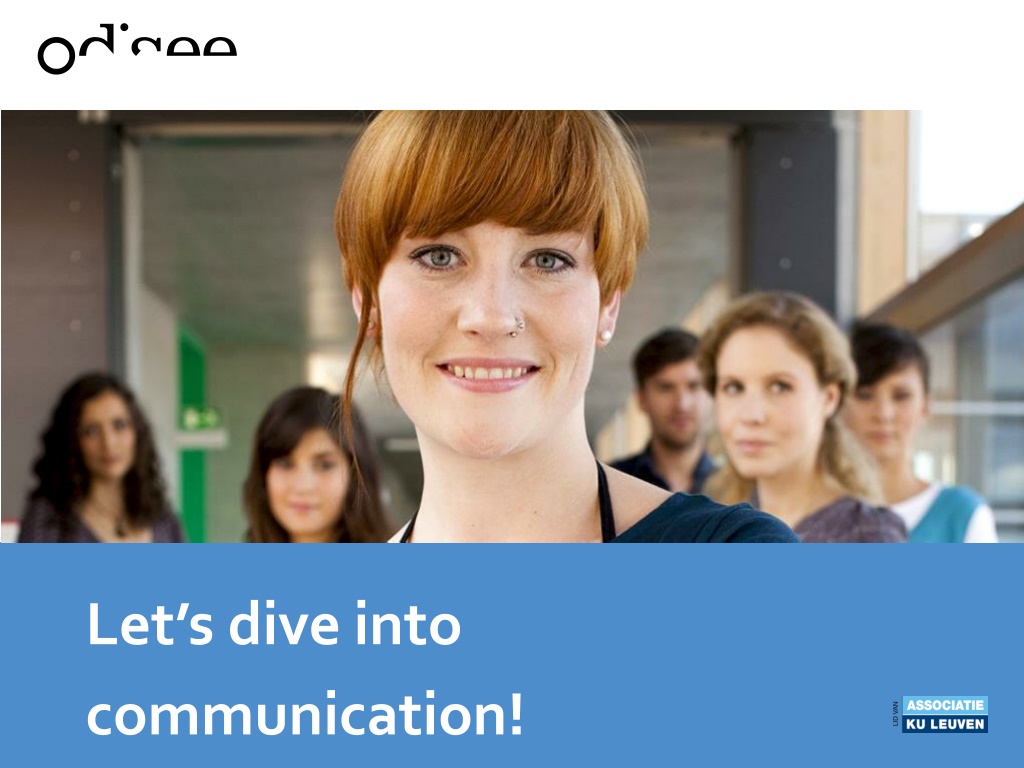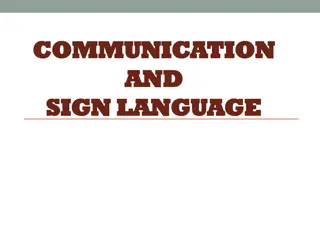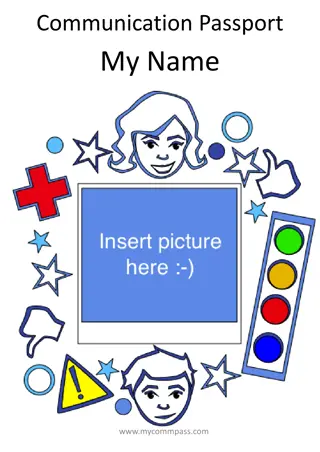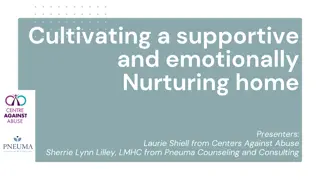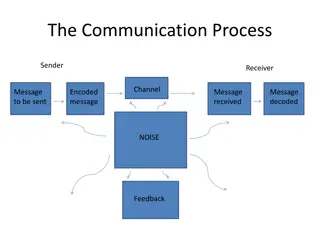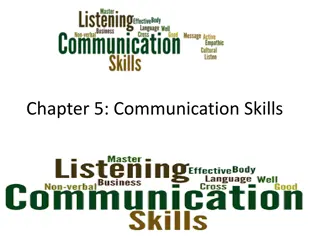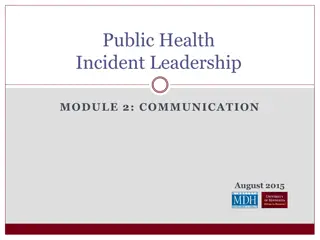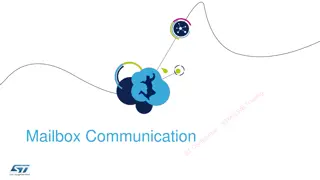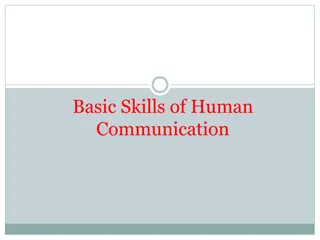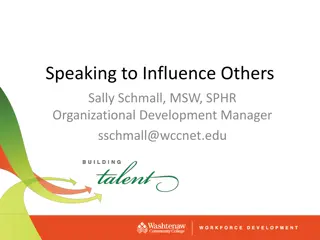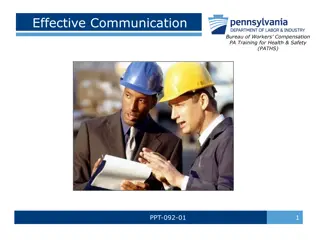Effective Communication Strategies
Dive into the theory and exercises of Motivational Interviewing, learn about dealing with patient frustrations and challenging behaviors, and understand the importance of effective communication in healthcare settings. Explore scenarios of nurse-patient interactions, addressing issues like alcohol use in patients with hepatitis. Discover the motivational aspects of conversations, handling client responses, and engaging in meaningful discussions about addiction, chronic diseases, and healthcare practices. Gain insights into the core principles of Motivational Interviewing and ways to promote behavior change effectively.
Download Presentation

Please find below an Image/Link to download the presentation.
The content on the website is provided AS IS for your information and personal use only. It may not be sold, licensed, or shared on other websites without obtaining consent from the author.If you encounter any issues during the download, it is possible that the publisher has removed the file from their server.
You are allowed to download the files provided on this website for personal or commercial use, subject to the condition that they are used lawfully. All files are the property of their respective owners.
The content on the website is provided AS IS for your information and personal use only. It may not be sold, licensed, or shared on other websites without obtaining consent from the author.
E N D
Presentation Transcript
Lets dive into communication!
Program Motivational interviewing: theory exercises Motivational interviewing 2 27/02/2025
Frustration nurse Discuss with your neighbour a behavior of a patient where you (or your colleagues) felt very frustrated. How is this possible, the patient should know that 3 Titel van footer 27/02/2025
I cant believe that a person who is suffering from hepatitis is still using alcohol frequently 4 Titel van footer 27/02/2025
Frustration Nurse Go back to your example: - How did the nurse react - How did the patient react - What did you think about the reaction 5 Titel van footer 27/02/2025
Nurses inform a lot, give solutions Look, if you go and eat a lot snacks, you will eat to many unhealthy lipids, your cholesterol will increase and that is a cause of a heart attack. you are short of breath and because of that you are not doing any exercises Because you are not doing exercises, you will gain weight, which makes you even move less. So you can treat your own shortness of breath. Maybe you can take a dog. Then you have do some exercises, you will feel better. Blablabla 6 Motiverende gespreksvoering 27/02/2025
Clients always have an answer - vaccination is disturbing the immunity of my child. - You can say that smoking is bad for my health but my grandfather was 93 years old and he didn t get lungcancer at all! - . - 7 Motiverende gespreksvoering 27/02/2025
Motivational interviewing William Miller and Stephen Rollinick Students of Carl Rogers Alcoholaddiction Targetgroups: Addiction (food, cigarettes, drugs, alcohol, ) Chronical diseases (therapy-adherence) Youthcare Dental health pracice Medication adherence Homework
9 Titel van footer 27/02/2025
The core of Motivational interviewing People don t change by hearing what others are saying but what they are saying in reaction to others (Pascal Blaise 17th century)
Definition Motivational interviewing is a directive, client- centered counseling style for eliciting behavior change by helping clients to explore and resolve ambivalence. Compared with nondirective counseling, it is more focused and goal-directed. The examination and resolution of ambivalence is its central purpose, and the counselor is intentionally directive in pursuing this goal.
Exercise Tell your neighbour about a behaviour that you would like to change a lot. Which behavior you would like to change? How would you like to change your behavior? What are the advantages/disadvantages of your behavior Which reasons do you have to change your behavior? Do you think you can succeed in changing your behavior (0-5) What makes it difficult? What could help you? Which advantages/disadvantages does your new behaviour have?
Manners to change a behavior When Goal Making a policy before Anticipate on problems Modelling Permanent (always) To show alternatives Define borders Now When violating the rules stop To give obsjective info To learn + Motivate Slowly process To guide towards a choice
Motivational interviewing: 4 fundamental processes Engaging Focusing Eliciting/Evoking Planning
Engaging = key concept The judgement of the client about the quality of the relation predicts if the client stays in treatment and what the result will be (Crits-Cristoph et al., 2011). How? What are the expectations? Hospitality? Positive and honest Values and goals 15
Why talking about values with the client? Through reflection on values the discrepance between values and behavior becomes clear, the notice of this gap can be a powerful instrument to change the behavior (Rokeach, 1973).
Engagement: pitfalls Guilt-question Chatting Assessment Advice/righting reflex/ fixing Focusing Labeling
To engage Cli ntoriented skills (ORAS): -Open questions -Reflections -Affirmation -Summary
Sofie 19 Titel van footer 27/02/2025
Open questions with a goal To elicit motivation Vb. What do you think that will happen when you don t change? Vb. What makes that people are nagging on you? Questions that differentiate and scale quetions Vb. When does it affect you the most ? Vb. What do you think about your chances to succeed on a scale from 0- 10 Questions about the past and future Vb. What are the things that changed since you started smoking weed? Vb. How will your life look like in 5 years?
Open questions with a goal The miracle question Suppose you are dreaming, one day you wake up and all your problems are solved. What would be different for you? To focus on the strengths and possibilities of the client What did you try already? How could you handle all this untill now? http://www.fredrikebannink.com/bannink/wp-content/uploads/2009/09/front-cover-OV-3e-druk1.jpg Book: 1001 oplossingsgerichte vragen F. Bannink
To reflect = to check if your interpretations were correct. Student: I don t see a way out, I can no longer handle it the way it goes. Teacher: you really would like to see some changes.
Reflections Simple reflections: paraphrase I tried to do some things to make me feel better, but nothing seems to help, except a beer. You keep on searching for other solutions than a beer. Complex = to add a meaning. I can t take it that he always gives comments on the way I raise my children. You are angy with him.
Reflections with a goal 1. To weaken a statement: I m sick of it. My mother always comments on the way I raise my child. I really hate it. It irritates you a little bit. Yes it irritates me a lot, the way she always critisises me. To strenghten a statement.: I m tired of it. My. My mother always comments on the way I raise my child. You are really angry with your mother. It s not that. She is still my mother. It just irritates me.
Reflections with a goal 3. To focus on ambivalence: I m reall enjoying smoking weed. My smoking causes some problems. It has to stop. On the one hand you are enjoying smoking on weed and on the same time you think it has to stop. 4. To bring up new elements. You are sad.
To confirm Focus on something good, not on the lack of something. Use the word you ex. I think you have a strong personality. Positive reconstruction. Ex. I m really chaotic.
Exercise positive reconstruction http://files.johanwild0.webnode.nl/200000088-1fbd920b73/slecht%20naar%20goed.jpg
To summarize Different goals: What is the focus of the story. To show that you are really listening To check if you understood correctly Not to lose track
Exercise summarize Person A: tell a story in a very chaotic way Person B: try to summarize the story in one or two sentences https://www.bernasco.nl/wp-content/uploads/2014/09/Storytellingisluisteren.jpg
Overal exercise You are a community nurse and on a daily base you see Martin. Martin is 67 years old and divorced, he has 3 children. Since 15 years he is suffering from diabetes, he also has obesitas. He is not always thinking of his diet. A healthy meal is replaced by lots of biscuits. He sleeps everyday till noon. During the night he is awake. To forget his problems he drinks alcohol. Today you are going to Eddy and you are trying to have a conversation about that.
Focusing A patient in mental health care is having hallucinations, is upset because he can t find a job, is feeling dissatisfied about the side-effects from his medication and he recognies that he is using more cannabis lately. What is the focus?
Focusing: pitfalls Too fast Perspective of the nurse Not a conscious process Without consent Role clarification
In between information Information and advice Is there no space for information and advice ? Yes, there is but follow this pattern: Elicit Provide Elicit Advice is not the fundament of MI Ask permission Underscore the personal choice
Information G: OK, can you tell me what alcohol does to you, to your body. C: First it makes me relaxed but afterwards I start shaking, if you know what I mean G: It sounds as if you really thought about it. You don t know for sure if alcohol makes you feel better or worse. If the alcohol isn t working anymore, something happens what you don t like. Can I tell you something about what alcohol does to other people who are stuggling with alcohol? C: Yes, OK. G: When people are drinking, I don t know what you think about what I told you What do you think about that? Is this clear? What can be applicable for you? 34
How can you focus? Use a diary Selftests Look at triggers 35 Titel van footer 27/02/2025
Domains of life Domains: Religion Partner Free time Money School/work Friends Health Happiness How important is religion for you? How happy are you now on this domain 36 Titel van footer 27/02/2025
Eliciting/ Evoking (ambivalence) Willing and not willing to change Doubts Yes but Arguments in favour and arguments against behavioral change Ambivalence = normal
Elicit Drawing out client s own ideas and reasons for change listening for and recognizing change talk selectively reinforcing change talk (and a minimum of sustain talk) summarizing change talk (change talk bouquet)
Change talk Desirability Ability to change Preparatory Change talk Reasons to change Needs for change Commitment Activation Mobilising change talk ; Getting ready for change Taking steps
Desirability What things do you want to change? What are you searching for? What do you hope to find in therapy? How bad do you want to stop smoking?
Ability to change? What do you think that could help you stop smoking? What are former successes in your life? How confident are you that you can manage?
Reasons to change? Why do you want change? What are the disadvantages when you keep on acting the way you do now? What is important in your life? The 3 reasons why I want to stop smoking are You have reasons to move on with your life the way you do now, but you also have reasons to change, what are these reasons
Needs for change How urgent is it to You have to stop because
Importance scale On a scale of 0-10, 0 being not important at all, and 10 most important, what number would you pick for yourself as to where you are with importance on this change? My answer is 2. How do you react? Wow, not bad! I m really happy that it is a 2 . Why are you at a ____, and not a zero? Could you tell me what would it take to get you to a four?
Other methods/questions to elicit change talk Asking for extremes Looking at the past Looking at the future Reactions to change talk Open questions, affirmation, reflections, summary
How to react on sustain talk? A straight reflection I don t believe that anger is my problem. Your anger didn t cause any problems. But yes, it dit. It is natural when you are caught up in a fight. A reinforced reflection I think it is ok in my relationship. You don t think that there is space for improvement A dubbelside reflection You find blowing irresistable and it makes you passive.
How to react on sustain talk? Strategic reactions To underscore the autonomy Repositioning Everybody drinks so much. You are really drinking with a top team. My husband is always giving comments on me He really must like you!
Hope and confidence Ability how confident are you that you could manage. the confidence scale
How to gain confidence Past successes Brainstorming Hypothetical thinking Radical change when multiple problems
